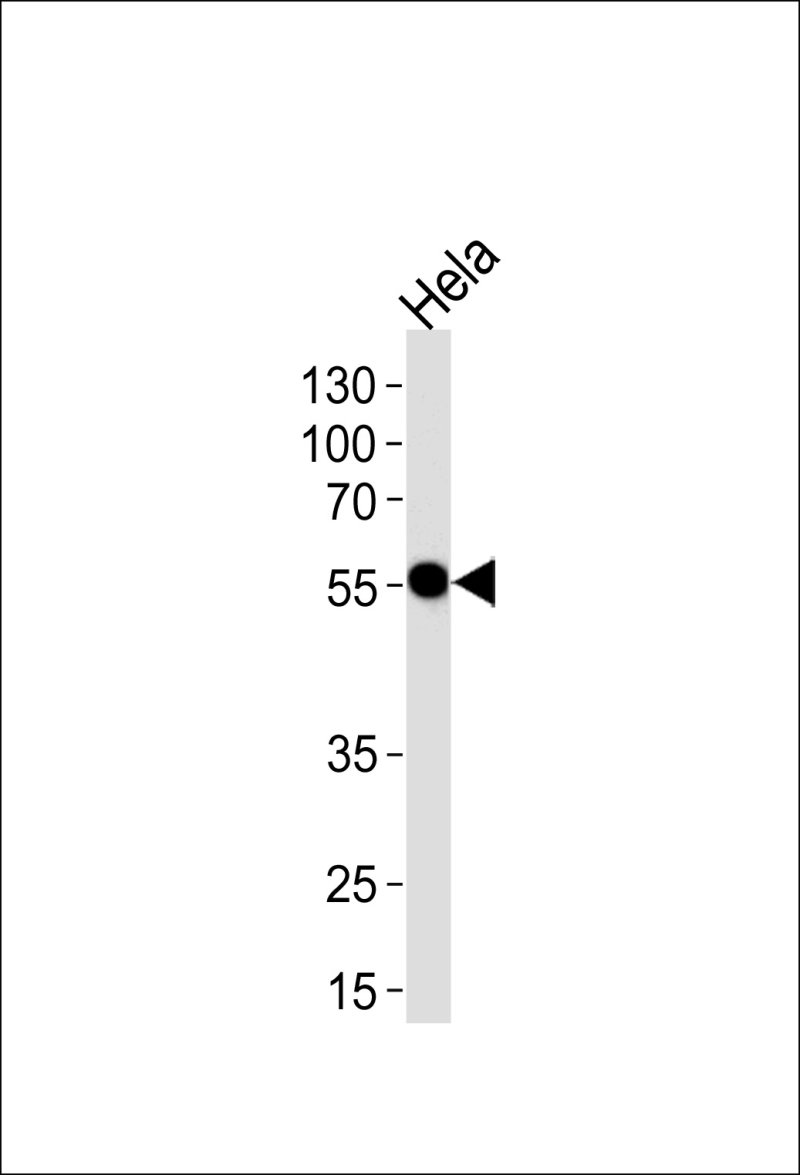
| WB | 咨询技术 | Human,Mouse,Rat |
| IF | 咨询技术 | Human,Mouse,Rat |
| IHC | 咨询技术 | Human,Mouse,Rat |
| ICC | 技术咨询 | Human,Mouse,Rat |
| FCM | 1/200 - 1/400 | Human,Mouse,Rat |
| Elisa | 1/10000 | Human,Mouse,Rat |
| Aliases | Probable ATP-dependent RNA helicase DDX6, ATP-dependent RNA helicase p54, DEAD box protein 6, Oncogene RCK, DDX6, HLR2, RCK |
| Entrez GeneID | 1656 |
| WB Predicted band size | 54.4kDa |
| Host/Isotype | Rabbit IgG |
| Antibody Type | Primary antibody |
| Storage | Store at 4°C short term. Aliquot and store at -20°C long term. Avoid freeze/thaw cycles. |
| Species Reactivity | Human |
| Immunogen | This DDX6 antibody is generated from rabbits immunized with a KLH conjugated synthetic peptide between 455-483 amino acids from the C-terminal region of human DDX6. |
| Formulation | Purified antibody in PBS with 0.05% sodium azide. |
+ +
以下是3篇涉及KMT2D抗体的代表性文献(信息基于公开研究总结,具体文献请以实际检索为准):
---
1. **标题**: "KMT2D maintains neoplastic cell proliferation and global histone H3 lysine 4 monomethylation"
**作者**: Zhang J, et al.
**摘要**: 研究利用KMT2D特异性抗体通过Western blot和免疫荧光技术,证明KMT2D缺失导致癌细胞中H3K4me1水平下降,并抑制细胞增殖,揭示了其在表观遗传调控中的关键作用。
---
2. **标题**: "Somatic mutations in KMT2D alter histone methylation profile and contribute to lymphoma pathogenesis"
**作者**: Ortega-Molina A, et al.
**摘要**: 通过免疫组化(IHC)和染色质免疫沉淀(ChIP)结合KMT2D抗体,发现淋巴瘤中KMT2D突变与H3K4me修饰异常相关,提示其作为肿瘤抑制因子的功能。
---
3. **标题**: "Kabuki syndrome-associated KMT2D mutations disrupt chromatin remodeling in developing zebrafish"
**作者**: Van Laarhoven PM, et al.
**摘要**: 使用KMT2D抗体进行斑马鱼胚胎的免疫印迹和免疫染色,发现突变导致胚胎发育异常及组蛋白修饰紊乱,支持KMT2D在Kabuki综合征中的致病机制。
---
4. **标题**: "Targeting KMT2D deficiency in cancer by PARP inhibition"
**作者**: Wang L, et al.
**摘要**: 研究通过流式细胞术和Western blot(使用KMT2D抗体)验证肿瘤细胞系中KMT2D蛋白表达缺失,并证明其对PARP抑制剂的敏感性,为精准治疗提供依据。
---
如需具体文献,建议在PubMed或Google Scholar中检索“KMT2D antibody”或结合研究场景(如“KMT2D ChIP-seq”、“KMT2D immunohistochemistry”)获取全文。
The KMT2D antibody is a crucial tool for studying the KMT2D gene (lysine methyltransferase 2D), which encodes a histone methyltransferase involved in epigenetic regulation. KMT2D, also known as MLL4. belongs to the COMPASS family and catalyzes mono- and di-methylation of histone H3 on lysine 4 (H3K4), a modification linked to active gene transcription. Mutations in KMT2D are associated with developmental disorders like Kabuki syndrome and various cancers, including lymphoma, breast cancer, and colorectal carcinoma, underscoring its role in cell differentiation, proliferation, and tumor suppression.
KMT2D antibodies are widely used in research to detect protein expression, localization, and interactions in tissues or cell lines. They enable techniques like Western blotting, immunohistochemistry (IHC), chromatin immunoprecipitation (ChIP), and immunofluorescence (IF) to explore KMT2D’s involvement in chromatin remodeling, transcriptional regulation, and disease mechanisms. These antibodies also help identify aberrant KMT2D expression or post-translational modifications in pathological contexts.
Quality validation of KMT2D antibodies is critical due to the protein’s large size (~550 kDa) and structural complexity. Researchers prioritize antibodies with high specificity, verified through knockout controls or siRNA knockdown. Commercial KMT2D antibodies vary in clonality (monoclonal/polyclonal) and epitope targets, requiring careful selection based on experimental needs. Their applications span basic epigenetics, cancer biology, and therapeutic development, particularly in studying KMT2D-related dysregulation and potential targeted therapies.
×